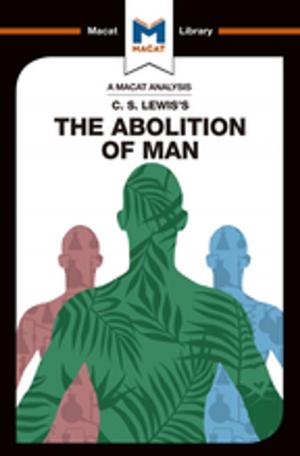Black Skin, White Masks
Nonfiction, Social & Cultural Studies, Social Science, Sociology, Fiction & Literature, Literary Theory & Criticism| Author: | Rachele Dini | ISBN: | 9781351351980 |
| Publisher: | Macat Library | Publication: | July 5, 2017 |
| Imprint: | Macat Library | Language: | English |
| Author: | Rachele Dini |
| ISBN: | 9781351351980 |
| Publisher: | Macat Library |
| Publication: | July 5, 2017 |
| Imprint: | Macat Library |
| Language: | English |
Frantz Fanon’s explosive Black Skin, White Masks is a merciless exposé of the psychological damage done by colonial rule across the world. Using Fanon’s incisive analytical abilities to expose the consequences of colonialism on the psyches of colonized peoples, it is both a crucial text in post-colonial theory, and a lesson in the power of analytical skills to reveal the realities that hide beneath the surface of things.
Fanon was himself part of a colonized nation – Martinique – and grew up with the values and beliefs of French culture imposed upon him, while remaining relegated to an inferior status in society. Qualifying as a psychiatrist in France before working in Algeria (a French colony subject to brutal repression), his own experiences granted him a sharp insight into the psychological problems associated with colonial rule.
Like any good analytical thinker, Fanon’s particular skill was in breaking things down and joining dots. His analysis of colonial rule exposed its implicit assumptions – and how they were replicated in colonised populations – allowing Fanon to unpick the hidden reasons behind his own conflicted psychological make up, and those of his patients. Unflinchingly clear-sighted in doing so, Black Skin White Masks remains a shocking read today.
Frantz Fanon’s explosive Black Skin, White Masks is a merciless exposé of the psychological damage done by colonial rule across the world. Using Fanon’s incisive analytical abilities to expose the consequences of colonialism on the psyches of colonized peoples, it is both a crucial text in post-colonial theory, and a lesson in the power of analytical skills to reveal the realities that hide beneath the surface of things.
Fanon was himself part of a colonized nation – Martinique – and grew up with the values and beliefs of French culture imposed upon him, while remaining relegated to an inferior status in society. Qualifying as a psychiatrist in France before working in Algeria (a French colony subject to brutal repression), his own experiences granted him a sharp insight into the psychological problems associated with colonial rule.
Like any good analytical thinker, Fanon’s particular skill was in breaking things down and joining dots. His analysis of colonial rule exposed its implicit assumptions – and how they were replicated in colonised populations – allowing Fanon to unpick the hidden reasons behind his own conflicted psychological make up, and those of his patients. Unflinchingly clear-sighted in doing so, Black Skin White Masks remains a shocking read today.















